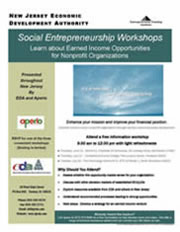| |
SOCIAL ENTREPRENEURSHIP
Team Faculty Mentor: David Prensky
Student Researcher: Valerie Koch
Social entrepreneurship is the development of a revenue generating program that matches the mission of the organization and is aimed at solving social issues. The revenue made from these types of programs is generally used in addition to donations and grant money and in turn increases the sustainability of the organization. Despite the availability of resources and encouragement by outside entities like the Economic Development Authority (EDA), organizations are still holding back. The following research project was designed to determine what non-profits in the Trenton area think about revenue generating programs and what they are or are not doing about it.
By using the Mercer Regional Chamber of Commerce non-profit membership database, we were able to complete ten interviews with non-profits and two interviews with outside entities, or capacity builders, within an eight week period. We also attended an introductory workshop on social entrepreneurship for non-profits held by the EDA and Aperio. While some had successful programs, the majority did not. Concerns included not having sufficient business skills to develop a program, lack of interest from board members and funding sources, legal concerns, lack of time or staff, unaware of sources that would cover start-up costs, and inability to brainstorm a money making idea. Overall, all of those interviewed had a positive attitude about the concept and all agreed that they would encourage other non-profits to consider it.
The non-profit world is facing decreasing sources of funding, increasing numbers of organizations, and therefore an intensified competition for needed income. The future of social entrepreneurship relies on the continued marketing of success stories and the availability of funding sources to cover pre-development costs. Non-profits could be more successful at creating and managing revenue generating programs by acquiring the appropriate business skills through training seminars. The future non-profit workforce also needs to realize that business skills are just as important as social service skills if they hope to assist in the success of their organization. Social entrepreneurship will greatly help the non-profit community if it continues in the right direction.


